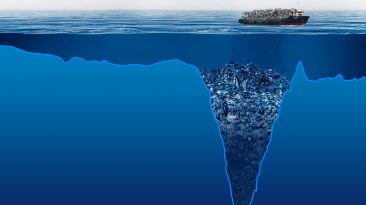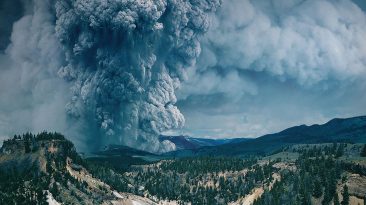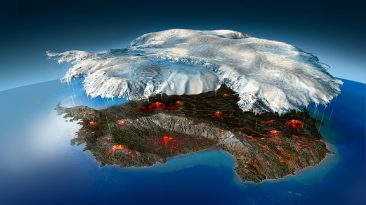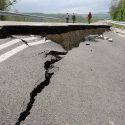Absolute zero is the lowest possible temperature in the Universe. Nothing gets colder than that. So if the entire Earth suddenly cooled down to the most frigid temperature for even five seconds, it would wreak a lot of havoc. Just how cold is absolute zero? What would happen to your own body at this temperature? And what would be the coolest thing about it?
Temperature is how we measure kinetic energy of the particles in any object. Simply put, it tells us how fast atoms, molecules and particles move. The hotter a gas, liquid or solid gets, the faster the particles move. And when that movement slows down, the colder the substance becomes. At the lowest temperature possible, or absolute zero, particles stop moving altogether.
This is because at 0 Kelvin, or -273.15 °C (-459.67 °F), no heat energy remains. The coldest ground temperature ever on Earth, 184 K, or -89.2°C (-128.6°F), was recorded in Antarctica in 1983. But it doesn’t even come close to absolute zero. Even the coldest known place in the entire Universe, the Boomerang Nebula, 5,000 light-years away from Earth, is just a tad warmer at 1 K, or -272 °C (-458 °F).
So are you ready for the coldest five seconds ever? At room temperature, that comfortable range of temperatures of about 293 K, the air molecules move at an average speed of 1,800 km/h (1,118 mph). As the temperatures on Earth suddenly plummeted, all those particles would slow down.
At 0.00001 Kelvin, the atomic particles would be moving at a speed of about 0.18 km/h (0.11 mph). That’s 1,000 times slower than their speed at room temperature. Getting this close to absolute zero, all chemical reactions would be closer and closer to coming to a complete stop. This would be very bad news for you and everything else on Earth.
Chemical reactions are responsible for everything. Including how your brain communicates with your body. Without the trillions of chemical reactions going on inside of you, you wouldn’t be able to breathe or turn food into fuel. Temperatures near absolute zero would be devastatingly cold. Even at a comparatively toasty 77 K, you’d be in serious danger.
That’s the temperature of liquid nitrogen. After a few seconds of exposure to this temperature, you’d suffer severe burns, blistering and frostbite. Needing a toe or ten amputated could be a definite possibility. So just five seconds of absolute zero could do incredible amounts of damage to ALL lifeforms on Earth. But I have good news.
The chemical reactions wouldn’t come to a total standstill. Even at the near absolute zero temperature of the Boomerang Nebula, chemical reactions do still appear to take place. This is thanks to the strange effects of quantum physics. And whenever quantum physics is involved, things get weird. With all the atoms on Earth at a near standstill, you’d find them starting to clump together.
They’d be forming a state of matter known as a Bose-Einstein condensate. This would mean that every atom is in the same energy state and essentially identical to one another from a physical point of view. They’d start to behave as a single atom. And if you could become a Bose-Einstein condensate, it would be pretty cool.
For those brief five seconds, you’d have some unique physical properties. Like superfluidity. You’d be able to flow through tiny cracks without any friction. Only there wouldn’t be any cracks, because you wouldn’t be the only superfluid thing on the planet. But there’s a catch. Bose-Einstein condensates can only be formed when bosons are cooled to near absolute zero.
Bosons are all atoms with an even number of electrons. That means only some of the atoms in your body and the environment around you could become a Bose-Einstein condensate. And luckily for you, reaching a temperature of absolute zero wouldn’t be possible. If Earth and everything on it plummeted to absolute zero, it would instantly pull the heat from the space around it.
To keep you and the planet at 0 Kelvin even for five seconds, you’d need an infinite amount of resources. This makes it mathematically impossible. But that wouldn’t mean that five seconds of near absolute zero temperatures wouldn’t destroy just about everything. And nothing would ever come back together from this soup of atoms that you and the entire planet would turn into.
Sources
- “Temperature And Temperature Scales | Chemistry For Non-Majors”. 2022. courses.lumenlearning.com.
- “Absolute Zero”. 2022. sciencedaily.com.
- “Temperature Is Not What You Think It Is”. Nast Condé. 2017. wired.com.
- “Racing Toward Absolute Zero”. Caitlin Gainey. 2019. blogs.scientificamerican.com.
- “The Coldest Place In The Universe”. Tom Shachtman. 2008. smithsonianmag.com.



























